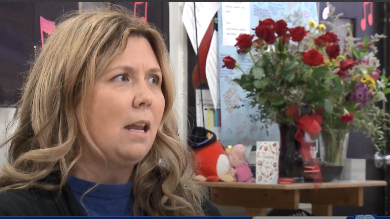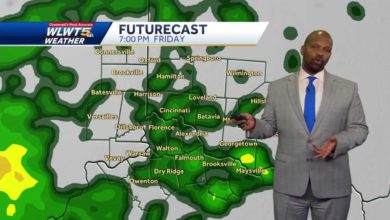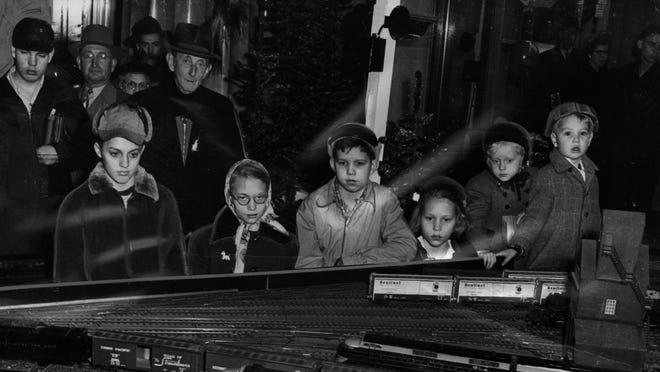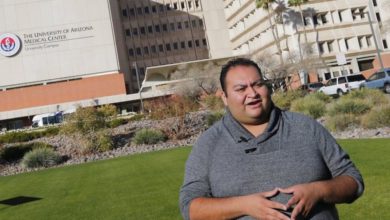

The night of the Waukesha Christmas Parade attack, Sarah Wehmeier-Aparicio said she realized something was wrong the moment the music stopped playing. "Some of the kids stopped playing and I thought, 'Why aren't they playing?'" Wehmeier said. "That's when the screaming started and I turned around and he started driving through the band."She's referring to Darrell Brooks Jr., who police said drove through the parade in an SUV. Six people died. More than 60 were injured. She said she watched as the SUV sped past within inches of her, then heard gunfire, as police shot at the vehicle. "The kids were running, but we still had several on the ground and then a police officer came running and said, 'Shots fired, everybody run,'" Wehmeier said. "A lot of students were injured, not able to move, just laying on the street and they just felt so helpless they were there."The rest of the students scattered in storefronts, all while Wehmeier's own family was somewhere else along the parade route. "I remember having to make that choice: am I going to be a mom right now or am I going to be the band teacher right now? I had to be the band teacher in that moment," Wehmeier said. "Just checking the store, 'How are you guys doing?' Next store, 'How are you guys doing?' Then on the streets," Wehmeier said. Wehmeier said community members trained in first aid helped tend to the injured students, while waiting for emergency responders. She said 12 of her students received medical treatment. Sister station WISN was there when the final student, Erick Tiegs, 16, returned home from the hospital on Tuesday. He was playing trombone when the driver in the SUV struck him. Wehmeier said some of the students' instruments likely protected their bodies from serious harm. "We did hear our sousaphone, which is the marching version of the tuba, the doctor said that probably saved (the student's) life because the way it wrapped around him, it created a barrier that protected him as the car went over," Wehmeier said. "He said, 'Thank goodness for that sousaphone, it saved your life.'" Wehmeier said since returning to school on Monday, the students have taken time to process the trauma by talking as a group, using the student services counselors and taking in the support that's flooded into their school. Hundreds of handmade signs, handwritten notes, flowers and gifts have poured in from around the country for the Waukesha South marching band. Comfort dogs also gathered outside the school one day to help students open up. "I know some of the students who were towards the back of the band, they've really struggled because, 'If I had been in the one spot over, that would have been me,' and 'I should have been in that spot.' It's a lot more survivor's guilt, that they wish they had been in the spot of their classmates so they could have taken that for them," Wehmeier said.Wehmeier said talking to each other about the trauma from that day has helped the group process the most. She also said starting to play again together as a band has helped students return to some sense of normalcy. She said once her students learned the Dancing Grannies, another group struck in the parade, planned to march in a parade this weekend, the band wanted to rehearse again. "For me personally, this is something somebody did to us and so it makes me feel extra strong about wanting to get back to normal," Wehmeier said. "I did mention to them about the Dancing Grannies and they said, 'You know what, we want to play tomorrow.'" "(The Dancing Grannies) resiliency in the number of people they lost from their group and the fact they're ready to do a parade again this weekend is amazing and a great example," Wehmeier said. "I know our students have been really inspired by them."Wehmeier said her life experience has prepared her for this work. "I've been through other traumas in my life, so I know, as hard as things are right now, there is going to be some light in this at the end of the tunnel," Wehmeier said. "My students don't have that life experience yet and I have a really special honor to get to be at their side to walk them through this." When asked what she is currently reflecting on, Wehmeier said she's wondering about how this could have happened. "How many other people are slipping through the cracks with mental illness and trauma in their lives that allows them to get to this point, where they think that driving a car through a parade is an OK thing? What can we learn as a society to be preventive and proactive, to stop these things from happening," Wehmeier said.
The night of the Waukesha Christmas Parade attack, Sarah Wehmeier-Aparicio said she realized something was wrong the moment the music stopped playing.
"Some of the kids stopped playing and I thought, 'Why aren't they playing?'" Wehmeier said. "That's when the screaming started and I turned around and he started driving through the band."
She's referring to Darrell Brooks Jr., who police said drove through the parade in an SUV. Six people died. More than 60 were injured.
She said she watched as the SUV sped past within inches of her, then heard gunfire, as police shot at the vehicle.
"The kids were running, but we still had several on the ground and then a police officer came running and said, 'Shots fired, everybody run,'" Wehmeier said. "A lot of students were injured, not able to move, just laying on the street and they just felt so helpless they were there."
The rest of the students scattered in storefronts, all while Wehmeier's own family was somewhere else along the parade route.
"I remember having to make that choice: am I going to be a mom right now or am I going to be the band teacher right now? I had to be the band teacher in that moment," Wehmeier said.
"Just checking the store, 'How are you guys doing?' Next store, 'How are you guys doing?' Then on the streets," Wehmeier said.
Wehmeier said community members trained in first aid helped tend to the injured students, while waiting for emergency responders. She said 12 of her students received medical treatment.
Sister station WISN was there when the final student, Erick Tiegs, 16, returned home from the hospital on Tuesday. He was playing trombone when the driver in the SUV struck him.
Wehmeier said some of the students' instruments likely protected their bodies from serious harm.
"We did hear our sousaphone, which is the marching version of the tuba, the doctor said that probably saved (the student's) life because the way it wrapped around him, it created a barrier that protected him as the car went over," Wehmeier said. "He said, 'Thank goodness for that sousaphone, it saved your life.'"
Wehmeier said since returning to school on Monday, the students have taken time to process the trauma by talking as a group, using the student services counselors and taking in the support that's flooded into their school.
Hundreds of handmade signs, handwritten notes, flowers and gifts have poured in from around the country for the Waukesha South marching band.
Comfort dogs also gathered outside the school one day to help students open up.
"I know some of the students who were towards the back of the band, they've really struggled because, 'If I had been in the one spot over, that would have been me,' and 'I should have been in that spot.' It's a lot more survivor's guilt, that they wish they had been in the spot of their classmates so they could have taken that for them," Wehmeier said.
Wehmeier said talking to each other about the trauma from that day has helped the group process the most. She also said starting to play again together as a band has helped students return to some sense of normalcy.
She said once her students learned the Dancing Grannies, another group struck in the parade, planned to march in a parade this weekend, the band wanted to rehearse again.
"For me personally, this is something somebody did to us and so it makes me feel extra strong about wanting to get back to normal," Wehmeier said. "I did mention to them about the Dancing Grannies and they said, 'You know what, we want to play tomorrow.'"
"(The Dancing Grannies) resiliency in the number of people they lost from their group and the fact they're ready to do a parade again this weekend is amazing and a great example," Wehmeier said. "I know our students have been really inspired by them."
Wehmeier said her life experience has prepared her for this work.
"I've been through other traumas in my life, so I know, as hard as things are right now, there is going to be some light in this at the end of the tunnel," Wehmeier said. "My students don't have that life experience yet and I have a really special honor to get to be at their side to walk them through this."
When asked what she is currently reflecting on, Wehmeier said she's wondering about how this could have happened.
"How many other people are slipping through the cracks with mental illness and trauma in their lives that allows them to get to this point, where they think that driving a car through a parade is an OK thing? What can we learn as a society to be preventive and proactive, to stop these things from happening," Wehmeier said.
Source link







